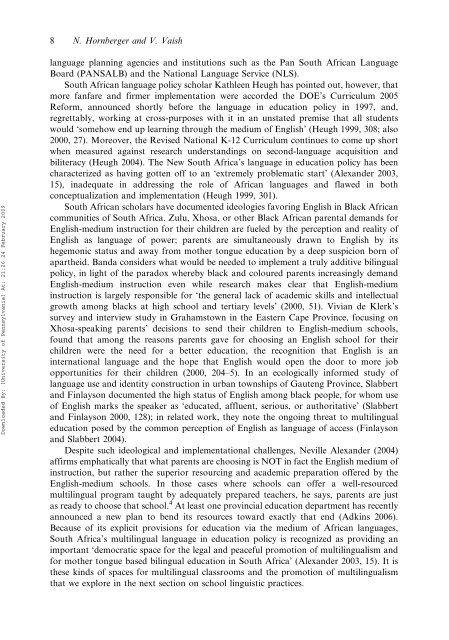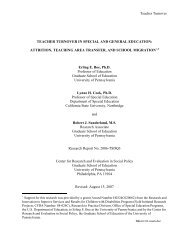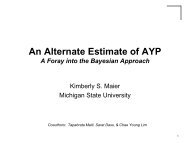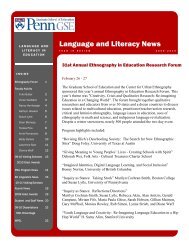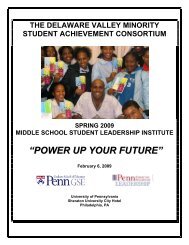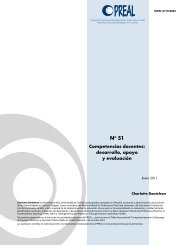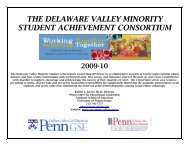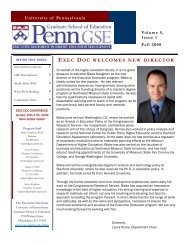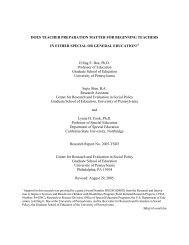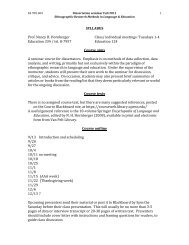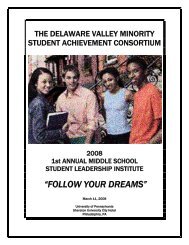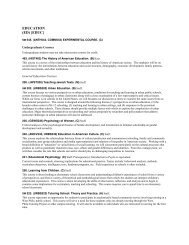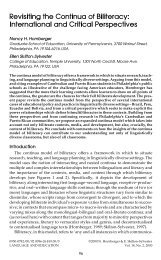Multilingual language policy and school linguistic practice
Multilingual language policy and school linguistic practice
Multilingual language policy and school linguistic practice
You also want an ePaper? Increase the reach of your titles
YUMPU automatically turns print PDFs into web optimized ePapers that Google loves.
8 N. Hornberger <strong>and</strong> V. Vaish<br />
Downloaded By: [University of Pennsylvania] At: 21:26 24 February 2009<br />
<strong>language</strong> planning agencies <strong>and</strong> institutions such as the Pan South African Language<br />
Board (PANSALB) <strong>and</strong> the National Language Service (NLS).<br />
South African <strong>language</strong> <strong>policy</strong> scholar Kathleen Heugh has pointed out, however, that<br />
more fanfare <strong>and</strong> firmer implementation were accorded the DOE’s Curriculum 2005<br />
Reform, announced shortly before the <strong>language</strong> in education <strong>policy</strong> in 1997, <strong>and</strong>,<br />
regrettably, working at cross-purposes with it in an unstated premise that all students<br />
would ‘somehow end up learning through the medium of English’ (Heugh 1999, 308; also<br />
2000, 27). Moreover, the Revised National K-12 Curriculum continues to come up short<br />
when measured against research underst<strong>and</strong>ings on second-<strong>language</strong> acquisition <strong>and</strong><br />
biliteracy (Heugh 2004). The New South Africa’s <strong>language</strong> in education <strong>policy</strong> has been<br />
characterized as having gotten off to an ‘extremely problematic start’ (Alex<strong>and</strong>er 2003,<br />
15), inadequate in addressing the role of African <strong>language</strong>s <strong>and</strong> flawed in both<br />
conceptualization <strong>and</strong> implementation (Heugh 1999, 301).<br />
South African scholars have documented ideologies favoring English in Black African<br />
communities of South Africa. Zulu, Xhosa, or other Black African parental dem<strong>and</strong>s for<br />
English-medium instruction for their children are fueled by the perception <strong>and</strong> reality of<br />
English as <strong>language</strong> of power; parents are simultaneously drawn to English by its<br />
hegemonic status <strong>and</strong> away from mother tongue education by a deep suspicion born of<br />
apartheid. B<strong>and</strong>a considers what would be needed to implement a truly additive bilingual<br />
<strong>policy</strong>, in light of the paradox whereby black <strong>and</strong> coloured parents increasingly dem<strong>and</strong><br />
English-medium instruction even while research makes clear that English-medium<br />
instruction is largely responsible for ‘the general lack of academic skills <strong>and</strong> intellectual<br />
growth among blacks at high <strong>school</strong> <strong>and</strong> tertiary levels’ (2000, 51). Vivian de Klerk’s<br />
survey <strong>and</strong> interview study in Grahamstown in the Eastern Cape Province, focusing on<br />
Xhosa-speaking parents’ decisions to send their children to English-medium <strong>school</strong>s,<br />
found that among the reasons parents gave for choosing an English <strong>school</strong> for their<br />
children were the need for a better education, the recognition that English is an<br />
international <strong>language</strong> <strong>and</strong> the hope that English would open the door to more job<br />
opportunities for their children (2000, 204–5). In an ecologically informed study of<br />
<strong>language</strong> use <strong>and</strong> identity construction in urban townships of Gauteng Province, Slabbert<br />
<strong>and</strong> Finlayson documented the high status of English among black people, for whom use<br />
of English marks the speaker as ‘educated, affluent, serious, or authoritative’ (Slabbert<br />
<strong>and</strong> Finlayson 2000, 128); in related work, they note the ongoing threat to multilingual<br />
education posed by the common perception of English as <strong>language</strong> of access (Finlayson<br />
<strong>and</strong> Slabbert 2004).<br />
Despite such ideological <strong>and</strong> implementational challenges, Neville Alex<strong>and</strong>er (2004)<br />
affirms emphatically that what parents are choosing is NOT in fact the English medium of<br />
instruction, but rather the superior resourcing <strong>and</strong> academic preparation offered by the<br />
English-medium <strong>school</strong>s. In those cases where <strong>school</strong>s can offer a well-resourced<br />
multilingual program taught by adequately prepared teachers, he says, parents are just<br />
as ready to choose that <strong>school</strong>. 4 At least one provincial education department has recently<br />
announced a new plan to bend its resources toward exactly that end (Adkins 2006).<br />
Because of its explicit provisions for education via the medium of African <strong>language</strong>s,<br />
South Africa’s multilingual <strong>language</strong> in education <strong>policy</strong> is recognized as providing an<br />
important ‘democratic space for the legal <strong>and</strong> peaceful promotion of multilingualism <strong>and</strong><br />
for mother tongue based bilingual education in South Africa’ (Alex<strong>and</strong>er 2003, 15). It is<br />
these kinds of spaces for multilingual classrooms <strong>and</strong> the promotion of multilingualism<br />
that we explore in the next section on <strong>school</strong> <strong>linguistic</strong> <strong>practice</strong>s.


